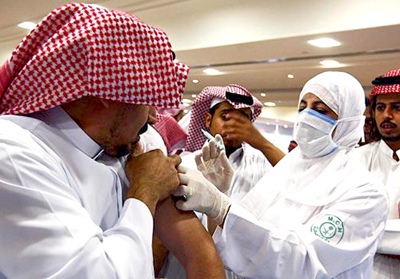 Riyadh, Nov 5: The Ministry of Health will launch a Kingdom-wide vaccination campaign against the seasonal flu today.
Riyadh, Nov 5: The Ministry of Health will launch a Kingdom-wide vaccination campaign against the seasonal flu today.
Health Ministry Spokesman Dr. Khalid Al-Mirghalani said the vaccination is suitable for people of all age groups including health officials, pregnant women, patients suffering from chronic diseases such as diabetes, renal problems, heart and thoracic diseases.
The flu shots will be available in all government hospitals and some 2,000 primary health care centers free-of-charge throughout the country. Health officials will visit schools to vaccinate children in the institutions. He added that the ministry would also carry out a health awareness campaign aimed at educating the masses on the importance of such vaccines during the onset of winter.
Speaking to Arab News, the director general of the Jeddah Directorate of Health Affairs in Jeddah, Dr. Sami Ba-Dawood, said the program is targeted to combat seasonal influenza that erupts during the cold season. However, he added that the seasonal flu can have other interactions with viruses such as MERS. “A timely flu shot could help prevent from influenza as well as it could prevent serious consequences of the fever,” he added.
Influenza is a serious disease that can lead to hospitalization and sometimes even death. Every flu season is different, and an influenza infection can affect people differently. Even healthy people can get very sick from the flu and spread it to others. Over a period of 31 seasons between 1976 and 2007, estimates of flu-associated deaths in the United States range from a low of about 3,000 to a high of about 49,000 people.
During a regular flu season, about 90 percent of flu-related deaths occur in people 65 years and older. “Flu season” in the United States can begin as early as October and last as late as May.
Meanwhile, the ministry announced two more fresh cases of MERS corona virus in Riyadh on Tuesday, bringing the total to 793 during the past two years.
Since June 2012, 338 MERS-related deaths were reported in the Kingdom. According to reports, the total number of people who recovered fully from the disease stood at 440, while 15 are currently receiving treatment in hospitals in various parts of the Kingdom.
The most recent MERS patients were a Saudi woman and an expatriate man, who were aged 31 and 33, respectively, in the capital. The majority of the recent MERS cases occurred in Taif, Madinah, Riyadh, Jeddah, Al-Jouf, Najran, Hofuf, Hafr Al-Batain and Jubail.
In consideration of the rise in sporadic cases of the virus in some parts of the Kingdom, the ministry has reiterated its appeal to the public to take preventive measures against the virus. It has advised people to avoid contact with camels and refrain from visiting MERS infected persons. Basic hygiene such as handwashing should be strictly followed before meals.
The ministry launched a Kingdom-wide awareness campaign on MERS corona virus in cooperation with the World Health Organization directly after Labor Minister Adel Fakeih took over duties as acting health minister.






Comments
Add new comment